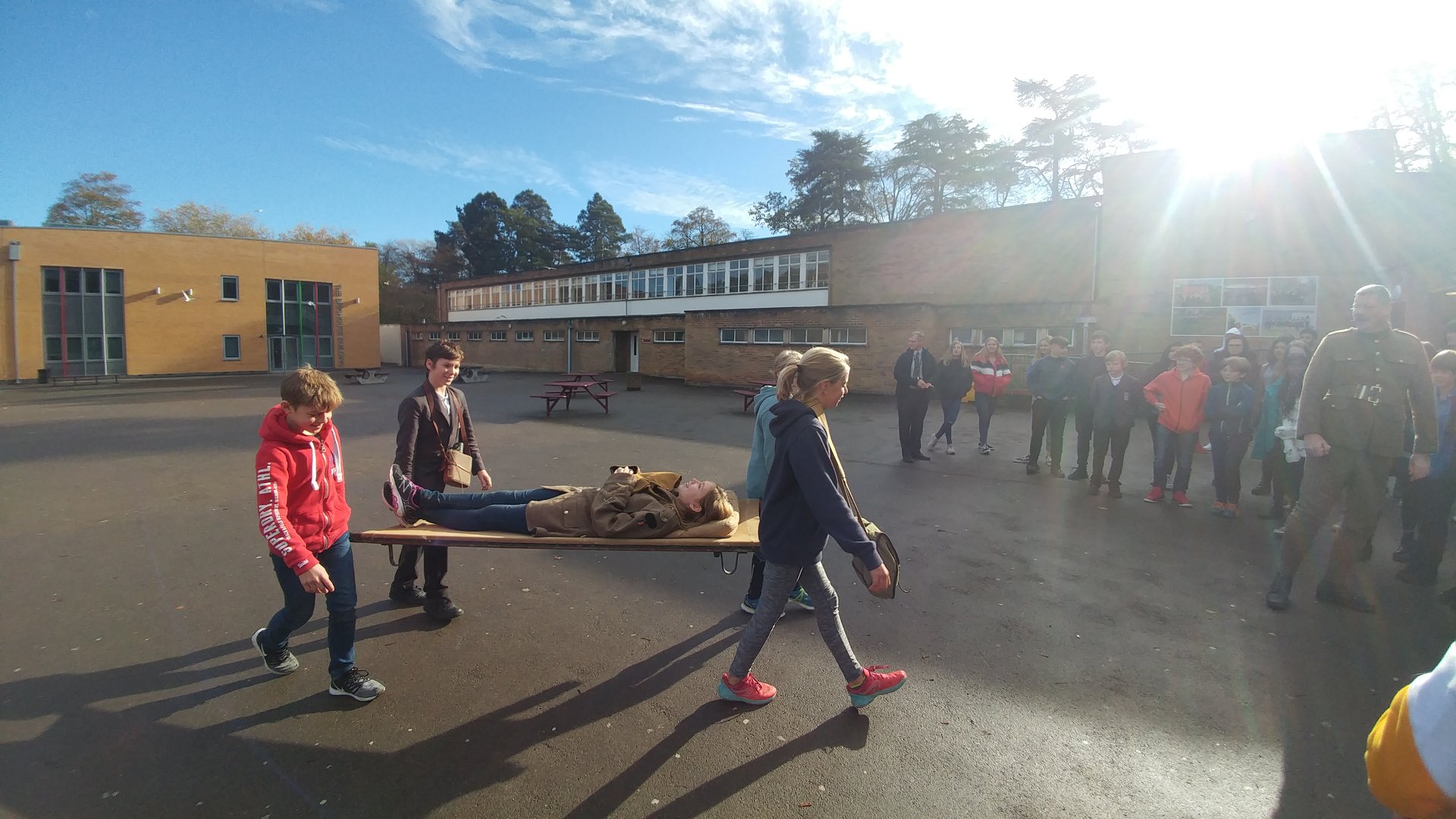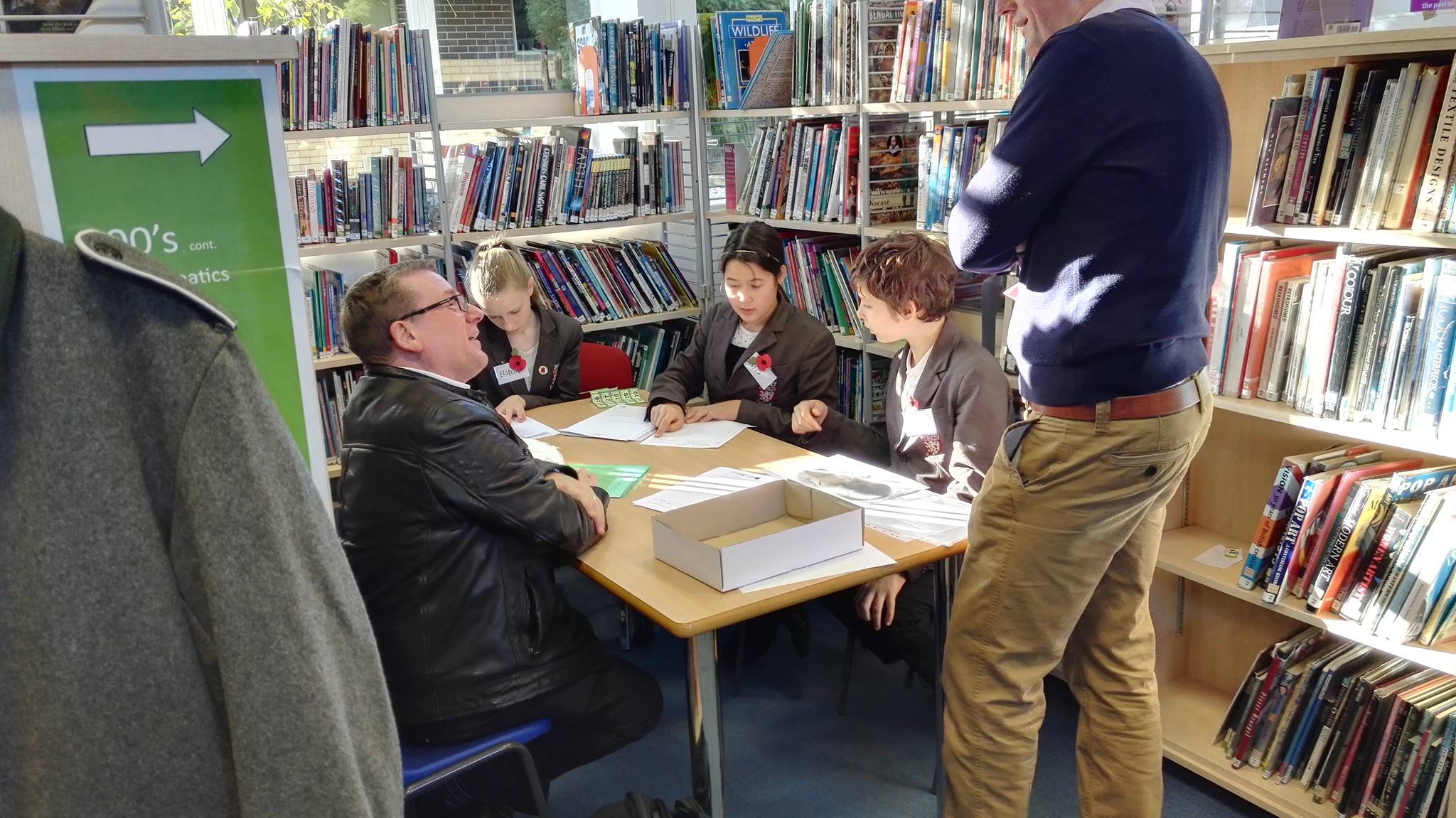
This Friday 2nd November, the Rumble Museum held its second digital collection day. The day was held in partnership with the University of Oxford, as part of their national
Lest We Forget project. The museum opened its doors to the community, who came with a wide range of items, including stories, photographs, medals, letters and diaries. As well as collecting items from the Wars, we were also collecting stories and items about pioneering women over the past 100 years, as part of our
Rumble Suffrage Season.
The day began with David Allton and Richard Townsley from Frontline Living History. They arrived bright and early with their amazing array of original and replica artefacts from World War One, ranging from helmets and guns to gas masks and a full set of surgical equipment, from bottles with the smells of gases that were used, to army uniform and much more. They ran two extremely informative workshops for Year Eleven students who are studying the history of medicine for their GCSE History. The students learned about how wartime led to a range of developments in medicine, and were talked through what would  happen to a wounded soldier. They were able to watch one of their class in character as a wounded soldier being carried by stretcher, and they discovered the various different types of treatments available to those fighting on the front line. Assisting them was Kate Vigurs, of History's Maid, who performed brilliantly in character as a nurse, speaking about the role of nurses in the War.
happen to a wounded soldier. They were able to watch one of their class in character as a wounded soldier being carried by stretcher, and they discovered the various different types of treatments available to those fighting on the front line. Assisting them was Kate Vigurs, of History's Maid, who performed brilliantly in character as a nurse, speaking about the role of nurses in the War.
At 2pm, the museum opened to the wider community. Local residents, staff, relatives of Cheney students and Cheney students themselves brought all sorts of items ad stories to the event, where they were met by our trained team of students as well as historian Stephen Barker, ready to record their stories and objects.
One gentleman brought a large portrait, a cross owned by his grandfather who had fought in World War One, and a number of letters written by his grandmother during the War. A number of people brought medals, letters and photographs. Someone brought a handwritten diary from the War. The objects and stories was diverse and fascinating and in some cases, the experts were able to shed new light on items and stories. We also had a number of stories about women from the local and wider community who have led interesting lives, faced adversity in all sorts of ways, and created exciting and inspirational ventures in the community.
The team of Cheney School students from Years Eight and Nine had been trained by Dr Stuart Lee from the University of Oxford to run all aspects of the process, from manning the welcome desk, and interviewing the visitors, to digitising the items by photograph.Every person who arrived was registered by the students, before being shown to an interview guest, where one student asked questions and another scribed the interview. At that point, the item was passed to the digitisation team whose role was to photograph the items.

We were very fortunate that historian Dr Stephen Barker was on hand to give information on items, and Frontline Living History showed visitors and students their artefacts, which members of the public were able to handle and find out more about. Kate transformed into a suffragette for the afternoon, and ran a stall with a range of fascinating artefacts, including a feeding tube which was used to force-feed suffragettes in prison. We were also delighted to welcome Suzette Starmer from the Oxford City Council Election Services who ran a stall about voting, including a very popular suffragette 'selfie' station!
We are very grateful indeed to everyone who took part in this event and especially proud of our student team who worked tirelessly to process the items and welcome our visitors. All the items will be uploaded onto either the Lest We Forget website (for war items) or the Rumble Museum Suffrage Season website for stories about women.

 This Friday 2nd November, the Rumble Museum held its second digital collection day. The day was held in partnership with the University of Oxford, as part of their national Lest We Forget project. The museum opened its doors to the community, who came with a wide range of items, including stories, photographs, medals, letters and diaries. As well as collecting items from the Wars, we were also collecting stories and items about pioneering women over the past 100 years, as part of our Rumble Suffrage Season.
This Friday 2nd November, the Rumble Museum held its second digital collection day. The day was held in partnership with the University of Oxford, as part of their national Lest We Forget project. The museum opened its doors to the community, who came with a wide range of items, including stories, photographs, medals, letters and diaries. As well as collecting items from the Wars, we were also collecting stories and items about pioneering women over the past 100 years, as part of our Rumble Suffrage Season. happen to a wounded soldier. They were able to watch one of their class in character as a wounded soldier being carried by stretcher, and they discovered the various different types of treatments available to those fighting on the front line. Assisting them was Kate Vigurs, of History's Maid, who performed brilliantly in character as a nurse, speaking about the role of nurses in the War.
happen to a wounded soldier. They were able to watch one of their class in character as a wounded soldier being carried by stretcher, and they discovered the various different types of treatments available to those fighting on the front line. Assisting them was Kate Vigurs, of History's Maid, who performed brilliantly in character as a nurse, speaking about the role of nurses in the War.
